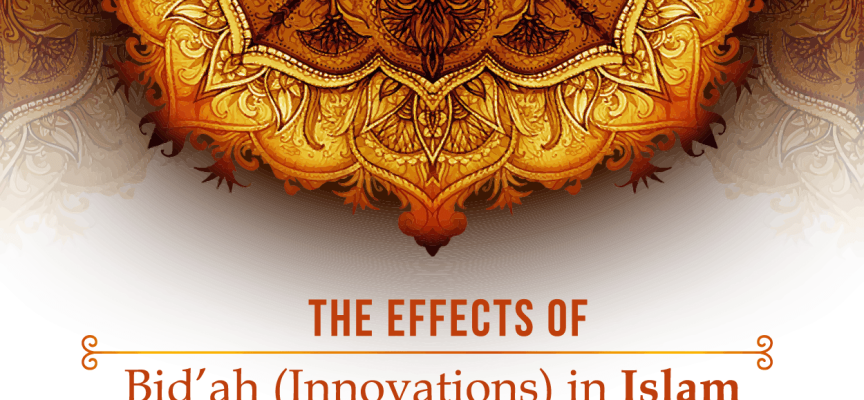Allah (SWT) asks us to become Muslims, which means to submit to him unconditionally and obey every command without question or modification. After the era of Prophet Muhammad (SAW) and his companions, people started straying from the Deen due to weakness in Iman. They started making amendments in the Deen by creating seemingly harmless innovations. Such innovations are what we refer to as bid’ah.
What is Bid’ah?
Bid’ah is the word for innovations in Arabic . It simply refers to any new addition in the Deen that didn’t exist before, regardless of whether it is well meaning or malicious. In other words, worshiping Allah in a manner that is not prescribed by Allah or which is not found in the sunnah of the Prophet (SAW) and his rightly guided companions is innovation (bid’ah).
Prophet Muhammad (SAW) said, “Whoever introduces a new thing in our affair (Deen) will have it rejected.” (Sahih Bukhari and Sahih Muslim)
“The worst deeds of all are innovations and every innovation is bid’ah and every bid’ah is deviation and every deviation will be in hellfire,” said Prophet Muhammad (SAW). (Sunnan Nasai).
An important point to understand here is that when we talk about bid’ah, it refers to innovations in matters related to our Deen – Islam. So, being a Muslim does not mean that we should live life exactly like in the days of the Prophet (SAW) and his companions. It may sound confusing, so consider this example, in the days of the Prophet (SAW) there were no cars, no phones, and no computers, so does this mean we shouldn’t use these things? Certainly not; we are free to innovate in such aspects of life. On the other hand, can we increase the number of rakah in namaz because we would get more ajr if we pray eight rakah in Asr instead of four?
Misconception about the Types of Bid’ah
There is a common misconception among Muslims including many scholars, that Bid’ah is of two types, one of which is permissible. The following statements from a classical Muslim scholar and a contemporary scholar, refute this position:
Ibn-e-Katheer commenting on Imam Shaf’ai’s classification of bid’ah, wrote in his tafseer,
“And bidah is of two types. Sometimes it can be a legislative innovation (bidah shar’iyyah), such as his saying, “Every newly-invented matter is an innovation and every innovation is misguidance” and sometimes it can be a linguistic innovation (bidah lughawiyyah), such as the saying of Amir al-Mu’minin Umar bin al-Khattaab, (radiallaahu anhu) about his bringing them together for the tarawih prayer and their continuance upon that, “What an excellent innovation this is.”
A Shafi’i scholar of our times, Ahmad bin Hajar Aal Butami, explains in his book Tahdhir al-Muslimin anil-Ibtidaa’ wal-Bida’ fil-Din,
“As for the saying of Imaam al-Shafi’i, “Bidah is of two types: praiseworthy and blameworthy. Whatever is in agreement with the Sunnah it is praiseworthy and whatever opposes the Sunnah is blameworthy”, the intent behind “praiseworthy innovation” is what has been innovated of beneficial matters relating to worldly affairs and [affairs of] habitation, livelihood such as the use of radio, electricity, airplanes, cars and using the phone and what is similar to that of good and beneficial inventions. This is because they are not harmful (in and of themselves) and do not lead (in and of themselves) to any evil that comes to the people, or to the performance of what is haraam or destroying any foundation from the foundations of the religion. And Allaah, the Sublime and Exalted, has permitted His servants to invent whatever they wish to look after their worldly interests, He, the Exalted said (وَافْعَلُوا الْخَيْرَ لَعَلَّكُمْ تُفْلِحُونَ), “And work good that you may be successful.”
A Famous Argument to Advocate Bid’ah
Many people use a hadith of the Prophet (SAW) as a proof for the permissibility of certain types of bid’ah, which translates as,
“Whoever revives a good Sunnah in Islam, he would receive its reward and the reward of those who practice it; while the rewards of those who practice it would not be lessened. Whoever innovates a practice in Islam, he would receive its sin and the sin of those who practice it, while the sins of those who practice it would not be lessened.” (Sahih Muslim)
However, the fallacy of this argument is self evident because the Prophet (SAW) mentioned revival of sunnah, which has no connection with bid’ah. An often cited example used in this regard is of Umar (may Allah be pleased with him) when he started Taraweeh congregation in Ramadan. Proponents of this argument say that one of the righteous companions of the Prophet (SAW) started a new thing in the Deen. They don’t realize that Umar (RAA) didn’t start something new; instead he revived a sunnah of the Prophet. Muhammad (SAW) offered Taraweeh prayer in congregation a few times but didn’t continue this because he feared the Muslims might begin to consider it an obligation.
It is also argued that Umar (RAA) said, “What a good Bid’ah this is!” It is evident that he used this term only linguistically because he revived a sunnah and had not instituted a bid’ah.
Why is Bid’ah Dangerous?
Hafiz Ibn al-Qayyim has described seven phases in which Shaytan destroys the believers; one of these phases in Bid’ah. According to him, when he a person engages in bid’ah, he believes that he is doing a good deed so he invites others as well. The person committing bid’ah doesn’t recognize that he is doing something wrong.
“The greatest sinner (faasiq) from the Ahl-Sunnah Wal Jamaah is better than the most pious person from Ahl-Bid’ah,” said Imam Ahmad Ibn Hanbal.
Another great danger is that practicing or advocating bid’ah often involves inadvertently forging lies against the sunnah of the Prophet (SAW). Prophet (SAW) said,
“To forge a lie against me is not like forging a lie against any person; whoever forges a lie against me, let him assure his seat in Hell-Fire.” (Sahih Bukhari).
May Allah guide us to the path of the righteous and save us from the hell-fire, Ameen!
(Image Courtesy: BigStockPhoto)







I liked this article, because majority of do know the destruction od bid`ah and their imaan and islam is in danger because shaitan is keeping them busy in this kinds of harmless deeds. May ALLAH save all muslims from fatality of bidah.
Shukran wa barakallahu fikum… Wa BILLAHI haza haqqun